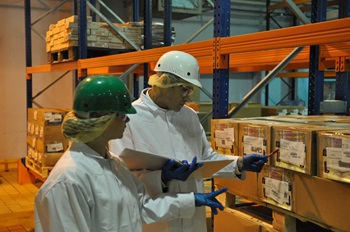Develop a Successful Internal Audit Program with the SQF Practitioner Training Program: Internal Auditing Course
Train and Gain on Continuous Improvement Efforts
 Internal audits have benefits for any type of site, regardless of the product. They aren’t just about ticking the boxes on a checklist. An effective internal audit program can drive continuous improvement across departments, support a healthy food safety culture and promote ownership and investment in food safety across your organization.
Internal audits have benefits for any type of site, regardless of the product. They aren’t just about ticking the boxes on a checklist. An effective internal audit program can drive continuous improvement across departments, support a healthy food safety culture and promote ownership and investment in food safety across your organization.
As part of our SQF Edition 9: Practitioner Training Program, we’ve recently released a new online course called SQF Implementing: Internal Auditing, part of a series of self-paced trainings and exams to help you prepare for a successful SQF certification.
Internal audits help the site to identify faults in their System so that it can be improved. The internal audit program is a verification method and when used properly, can identify risk, areas for improvement and/or needed corrective and preventative actions prior to an external audit or the occurrence of a food safety event.
In the Internal Auditing course we’ll teach you how to implement a robust internal audit program that drives continuous improvement, supports food safety culture, and improves compliance with the latest SQF Code Edition 9. The interactive approach used in this SQF online course allows practitioners to see how a method like the traceback approach provides a comprehensive means to verifying their food safety and quality programs.
This course is currently offered in both English and Spanish.
Benefits of the SQF Implementing: Internal Auditing Course
Throughout this course, we will give you the tools and knowledge needed to effectively implement an internal audit program. Together we will:
- Describe the difference between an inspection and an audit
- Discuss why an internal audit program is beneficial
- Apply the traceback approach to the internal audit plan
- Share successful internal audit tips and how to use them
Recent Blog Posts
SQF Code Edition 10 represents a critical step forward in ensuring rigorous yet practical food safety management across the supply chain.
In an industry where compliance and operational integrity are nonnegotiable, manufacturers and suppliers need more than just certification — they need a globally recognized solution.
Renee McVey is one of the first industry professionals to hold the Safe Quality Food Institute’s new Certified SQF Practitioner credential, which is administered by Exemplar Global.




